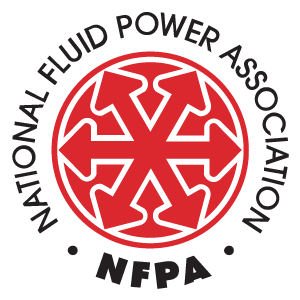
The NFPA Education and Technology Foundation has awarded 20 $2,000 scholarships to students pursuing fluid power related fields of study.
One of the winners, Evan Fender, is attending Wright State University, and was selected for a Tom Wanke Legacy Fund Award. Evan is a second-year NFPA scholarship recipient. We asked Evan a few questions about winning the scholarship.
What does winning a Tom Wanke Legacy Fund Award mean to you?
Winning the Tom Wanke Legacy Fund award is a great honor and validation of my dedication to the field. It represents not only recognition but also the opportunity to further my goals in fluid power and engineering. I am extremely grateful for the support this award provides as I continue pursuing my passion and striving to make an impact in engineering.
What class(es) did you take within the last year that expanded your understanding of fluid power?
Throughout the last year, I have taken multiple engineering courses that have furthered my mathematical and technical knowledge. One of the most interesting of these classes to me was my General Physics class. This class went over both the math and theory that govern how the universe works. One of the most interesting topics it went over was fluid dynamics. In this section, we were able to learn how fluids react when put under pressure and the forces and equations that govern this reaction.
Before this course, I had a decent understanding of pneumatic and hydraulic systems and the principles that made them work from my experience using them in VEX robotics and working on heavy machines that utilized them. I knew that the unique incompressibility property of water and hydraulic fluid allowed for massive amounts of force to be transferred but little knowledge of the math and laws that made this work.
Throughout this section of the course, I was amazed at the functionality and applicability of fluid theory and the almost magical way in which simply changing the cross-sectional area of a pressure tube allowed for a small force to be able to push a weight multiple times larger than it. The ease with which fluid power systems could transfer a small force to the movement of a much larger object through simple pressure was astonishing and gave me a new respect for modern fluid power systems. These systems were not only effective but also very flexible and space efficient and could be put almost anywhere with just a little space. Through this class and the knowledge I gained from it, I have found a new interest in the manufacturing and hands-on creation of mechanical systems. I hope to be able to continue this interest by taking more college courses to learn more about these systems.
Did your coursework impact your long-term career plans? If so, how?
I have chosen to pursue a career in manufacturing rather than the design of these systems, and I still retain my love for aviation and space and hope to continue my career on these paths. I hope to be able to acquire internships and eventually careers in the aviation industry. In this field, I believe that the implementation and continued development of fluid power systems are crucial to furthering technology and pushing the limits of what is currently possible. These careers appeal to me because they offer me a chance to make a difference in the world and be a part of something that can advance our knowledge of what’s possible. I believe that fluid power is a vital aspect of this and hope to be able to incorporate my passion for fluid systems into my career.
A minimum GPA of 2.5 out of 4.0, 500-word essay, and letter of recommendation were required from each applicant. The NFPA Foundation’s goal is to help graduating high school students, and individuals enrolled in community colleges, technical schools and universities pursue their academic interests in fluid power.
Through the Thomas Wanke Legacy Fund Awards, the NFPA Education and Technology Foundation aims to increase both the number of students studying fluid power, and also the quality of fluid power education in our nation’s universities – two goals clearly aligned with and ennobled by Tom’s life and legacy.
One way NFPA members can get involved with scholarship programs is to volunteer as a judge to serve on the application review committee. This year 27 judges from 19 NFPA member companies reviewed 122 eligible student applications to the Fluid Power Scholarship program. If you are interested in learning more, please contact Haley Nemeth at hnemeth@nfpa.com.
Like this post? Share it!
Recent Posts
Update to Regional Demand Estimates Report Now Available
The U.S. Fluid Power Regional Demand Estimates Report has been updated with 2023 estimates and is now available for download. This Excel-based report is prepared for NFPA by Oxford Economics and profiles the geographic distribution of fluid power products to end-use industries by state, including fluid power sales dollars, fluid power sales percentage, and number of…
Hear from an NCAT Student Engaged in NFPA Workforce Programs
We’re excited to share a new testimonial video from David Castro Lastor, a junior mechanical engineering student at North Carolina Agricultural and Technical State University and president of the university’s Fluid Power Club. In his video, David shares how participating in NFPA programs has shaped his academic and personal growth. Through his leadership in the…
New Episode of Fluid Power Forum: Advanced Modeling Techniques and Performance Comparisons of Electrohydraulic Systems
Today, our guest is Bruno Dupuis. Bruno is a Corporate Accounts Manager at Famic Technologies Inc., the company behind the development of Automation Studio™, a circuit design and simulation software for fluid power, electrical, robotics, process control and automation projects. He presented at NFPA’s Hydraulics Conference co-located at the 2024 iVT EXPO back in August.…



